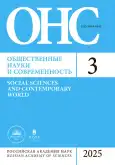The Politics of Multilateralism: Egypt and UAE amid Russia–West Tensions
- 作者: Ibragimov E.I.1
-
隶属关系:
- Primakov National Research Institute of World Economy and International Relations
- 期: 编号 3 (2025)
- 页面: 74-87
- 栏目: Africa today
- URL: https://journals.eco-vector.com/0869-0499/article/view/691343
- DOI: https://doi.org/10.31857/S0869049925030061
- EDN: https://elibrary.ru/kaufzn
- ID: 691343
如何引用文章
详细
The modern world is experiencing significant transformations, involving reforms of old institutions and creation of new ones. These changes are accompanied by challenges that lead to conflicts and crises, thereby altering global processes and contributing to the establishment of new norms in international politics. Increasing tensions between major powers, such as Russia and NATO countries, pose a serious threat to global stability and security. Additionally, regional conflicts can influence broader processes by changing the parameters and dynamics of conflicts. In this context, many states are reassessing their foreign policy strategies and alliances. The policy of multilateralism is gaining particular importance as countries strive to maintain independence and sovereignty. Conflicts act as catalysts for rethinking the principles of international relations and developing new mechanisms to ensure global security and stability. This study explores the balancing policies of Egypt and the UAE and their positioning amidst geopolitical upheavals. Both countries, aiming to enhance their sovereignty and global roles, adopt a measured diplomatic approach. They play pivotal roles in regional stability and international relations, actively engaging in alternative associations, such as BRICS+ and the SCO. As key players in Middle Eastern geopolitics and significant regional partners of Russia, Egypt and the UAE have adopted a stance of cautious neutrality. Their increased trade turnover and cooperation with Russia underscore their pragmatic foreign policy, characterized by efforts to balance international relations, avoid over-dependence on any single global power, and safeguard their national and economic interests. The research emphasizes the importance of multilateralism in contemporary international relations and offers an examination of Egypt’s and the UAE’s strategies within the context of global and regional changes.
作者简介
E. Ibragimov
Primakov National Research Institute of World Economy and International Relations
编辑信件的主要联系方式.
Email: ibragim07_93@mail.ru
Moscow, Russian Federation
参考
- Melkumyan E.S. (2022) United Arab Emirates Space Activity: Breaking the Stereotypes. World Economy and International Relations. Vol. 66. no. 5. Pp. 78–87. https://doi.org/10.24833/2071-8160-2017-4-55-139-153 (In Russ.)
- Melkumyan E.S. (2023) Arabskie monarkhii Zaliva v XXI veke: regional’nye i global’nye aspekty vneshnei politiki [Arabian Monarchies of the Gulf in the 21st Century: Regional and Global Aspects of Foreign Policy]. Moscow: Institut Vostokovedeniya RAN. 317 p. (In Russ.)
- Parkhalina T. (2019) The Present and Future of Multilateralism. Evropeiskaya bezopasnost: sobytiya, otsenki, prognozy. No. 55 (71), pp. 2–7. (In Russ.)
- Aiyar M.S., Ilyina A., Lekniute Z., Nguyen L., Raffinot M., Roitman A., Tiffin A., Valderrama L. (2023) Geo-economic Fragmentation and the Future of Multilateralism. Washington: International Monetary Fund.
- Dobrescu M. (2023) Between Strategic Neglect and Geopolitical Realities: Ukraine and North Africa in Light of Russian Aggression. Mediterranean Politics. Pp. 1–11. https://doi.org/10.1080/13629395.2023.2176610
- Elhadidi A. (2018) Egypt’s Shifting Foreign Policy Priorities. The Cairo Review of Global Affairs. No. 29. Pp. 79–87. The Future of Multilateralism: Global Cooperation and International Organizations (2021). Hosli M.O., Garrett T., Niedecken S., Verbeek N. (eds.) Lanham: Rowman & Littlefield.
- Russia in the Middle East (2018). Karasik T., Blank S. (eds.) Washington: The Jamestown Foundation. 448 p.
- Ketbi E.A. (2020) Contemporary Shifts in UAE Foreign Policy: From the Liberation of Kuwait to the Abraham Accords. Israel Journal of Foreign Affairs. Vol. 14. No. 3. Pp. 391–398.
- Lavelle K.C. (2020) The Challenges of Multilateralism. New Haven: Yale University Press.
- Piazza B.A. (2019) The Foreign Policy of Post-Mubarak Egypt and the Strengthening of Relations with Saudi Arabia: Balancing between Economic Vulnerability and Regional and Regime Security. The Journal of North African Studies. Vol. 24. No. 3. Pp. 401–425. https://doi.org/10.1080/13629387.2018.1454650
- Salisbury P. (2020) Risk Perception and Appetite in UAE Foreign and National Security Policy. London: Royal Institute of International Affairs. 41 p.
- Selim G.M. (2020) Egyptian Foreign Policy after the 2011 Revolution: The Dynamics of Continuity and Change. British Journal of Middle Eastern Studies. Vol. 49. No. 1. Pp. 1–22. https://doi.org/10.1080/13530194.2020.1747983
- Shama N. (2020) Egypt’s Middle Power Aspirations under El-Sisi. In: Saouli A. (ed.) Unfulfilled Aspirations: Middle Power Politics in the Middle East. London: Oxford University Press; Hurst & Company. Pp. 91–111.
- Sharp J.M. (2023) Egypt: Background and US Relations. Washington: Congressional Research Service, the Library of Congress. 39 p.
补充文件









